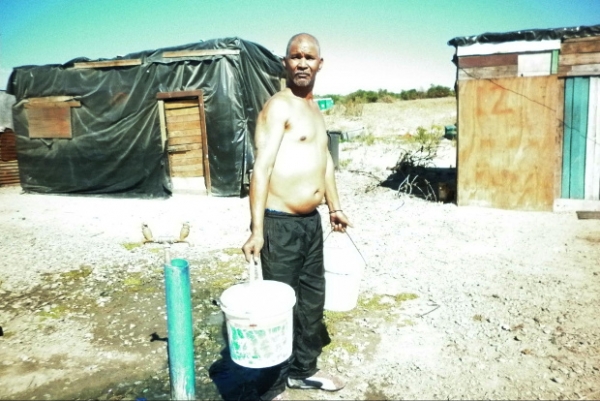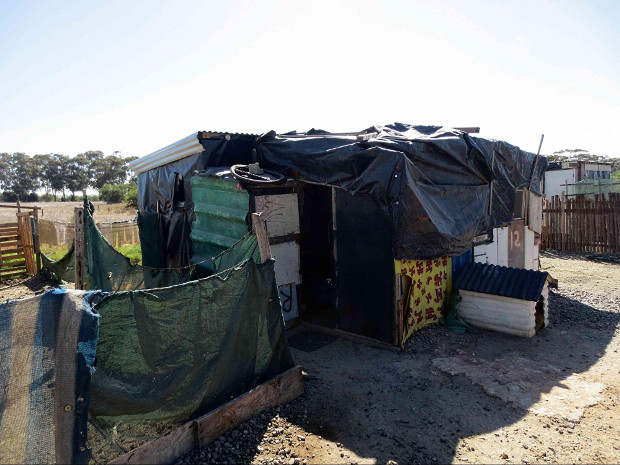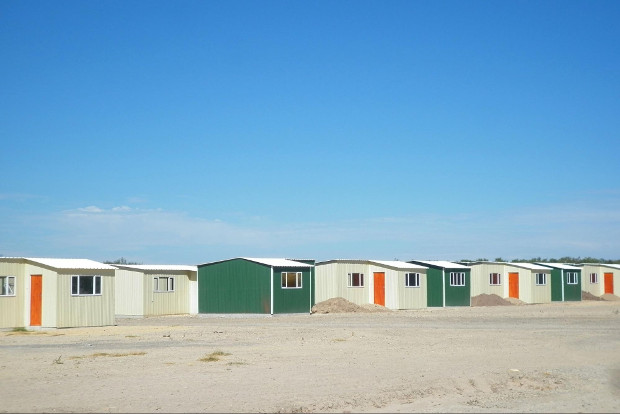Will Wolwerivier be a model for development, or the next Blikkiesdorp?

Loud barks from a multitude of dogs are what you hear when entering the small area of Wolwerivier, where 28 families live under difficult conditions.
Unemployment, alcohol abuse, drugs and illnesses including TB are among the community’s many troubles. But some residents living in this informal settlement, say they do not want to move to temporary houses being built by the City of Cape Town, known as an incremental development area (IDA).
Standing next to the tap, with just his pants on in the heat, 62-year-old Charles Grove fills up two small buckets. Grove has been living in Wolwerivier for 37 years and he is not keen to move to the IDA. He says he was brought to Wolwerivier near Melkbosstrand (about 35km north of the Cape Town CBD) along with others, after being moved from Richmond Park.
Last year, he lost his dog in a fire that broke out in the informal settlement near his home. Five homes were burnt down.
Community worker Toni Tresadern, who has built a relationship with the residents in the informal settlement, said conditions in the area were terrible:
“Just yesterday police came to raid the local shebeen. They came here with vans and the Canine Unit. The woman who owns the shebeen was arrested — I’m not sure why. But she along with her brother are believed to be selling drugs in the shebeen. She has been arrested numerous times and each time she comes out on bail, and she carries on with her business of selling alcohol and drugs. Almost all the young children in this area have foetal alcohol syndrome. There are also lots of illnesses, like HIV and drug resistant TB. Right now, one of the children, a seven-year-old, is lying in hospital with TB. And it’s not only people who fall ill. Animals get sick too. As you can see there are many dogs around here. Most of the people here are unemployed and drink most of the day. Some wander along the N7 highway, hoping to get some work.”

Wolwerivier informal settlement has 28 families who complain that there is no electricity, jobs or health care facilities in the area. Photo by Mary-Anne Gontsana.
Tresadern said another sad thing was that the community was not closely knit and there was little mutual support, “It is every man for himself”. Most of the residents did not have any identification and families ranged from five to six members per family. Tresadern also claimed that a census had not been done in the area so it was hard to tell how many people were accounted for. Wolwerivier had no electricity.
The Development Action Group (DAG), an organisation that deals with forced removals, conducted a site visit to Wolwerivier and Skandaalkamp this week. The organisation found out in January that the City was investigating the expansion of the Wolwerivier incremental development area. One thousand sites were to be added.
Last month, the City announced the establishment of a new low cost housing project where the first phase would accommodate 500 units.
The project, which is a five to ten minute drive from the Wolwerivier informal settlement, has a striking resemblance to Blikkiesdorp, a temporary relocation area (TRA) in Delft, with its side by side structures and sandy ground.
Magdalene Minnaar, a Wolwerivier community leader, and also one of the residents who would be moved to the IDA said she was not happy about moving into the new green structures that have been built:
“These houses are very small, I have two children and a grandchild, I have furniture, a bed. How is that all going to fit into this little space? There is no privacy; a person can just walk up and down and around your house and you can’t even tell them to get away. How are we expected to get jobs and go to shops when we are in the middle of nowhere. There is no transport here, no schools, no health facilities, no infrastructure at all.”

The new low-cost housing project by the City of Cape Town on Wolwerivier Farm. Some people say they do not want to stay there. Photo by Christine Ayela.
The 26 square metre structures are very hot inside. The open plan structure is fitted with a tiny room for the toilet pot. In a corner, there is a waist high black plastic basin. There is barely enough room for kitchen space, bed or couch space. When inside, people from organisations visiting the site could be heard mumbling that the area looked like a concentration camp.
According to DAG, even though the place resembled a TRA, it was “considered permanent with the City’s aim for residents to finally gain ownership.”
Josette Cole, Executive Director of DAG and Research Associate with the Centre for Archive and Public Culture at the University of Cape Town said they believed that the TRA was a non-option. It was completely isolated and made no sense in terms of human settlement:
“This is not a solution, it will just create more problems. This is just like Blikkiesdorp, they are going to end up with all the social problems. Wolwerivier is an indication of an approach of helping the poor in our city. It does not reflect a caring and inclusive city. As DAG we are doing all we can to find other alternatives.”
Councillor Benedicta van Minnen, the City’s Mayoral Committee Member for Human Settlements, emphasised that the area was not a TRA but an IDA which “is being developed with the intent of being upgraded on an incremental basis which will enable the long-term possibility of land transfer to the beneficiary, should they not have taken up an alternative housing opportunity. She says:
“The primary purpose for the implementation of this project is to relocate approximately 300 families living adjacent to the Vissershok landfill site, as well as 164 families from other informal settlements in the surrounding areas. The original relocation date was scheduled for February 2015. However, due to unforeseen delays related to wayleaves [a right to cross land] from external organisations, further delays to the relocation date are anticipated. The City can confirm that 464 structures will be built. While the site is not ideally located at this stage, the broader site of Wolwerivier is currently in the planning stages for a mixed residential use and business development to take place. It will be increasingly well-located as development takes place in the growth corridor. Furthermore, the premixed access road to the IDA provided will cater for public transport to access the area. There are also open spaces provided for community facilities, farming, livestock and greening areas for growing vegetables.”
Besides families in the Wolwerivier informal settlement, families from Radar Road informal settlement, Frankdale informal settlement, Spoorkamp informal settlement and Table Bay would also be relocated. Van Minnen says:
“These residents will live in their new serviced structures until they can be accommodated by one of the formal housing programmes. The master planning of the site also took into consideration the need for facilities like an Early Childhood Development site, a site for crèches, and a play park facility on the public open space. The short-term plan is to establish mobile facilities on the spaces provided, and to investigate formalisation in the coming financial year. The communities do not currently have access to any of these facilities, so this move must be seen as a step in the right direction, and a reflection of the City’s commitment to caring about our residents and redressing the imbalances created by apartheid.”
Van Minnen said the City would spend approximately R50 million on civil engineering infrastructure and emergency housing top structures. The structures had internal water and sanitation, which limited their size, but big families would be issued with an additional structure to house everyone. She also said the City’s transport planning was in the process of registering a taxi route via Wolwerivier IDA and City Health would provide mobile clinics on a regular basis until the entire area was developed.
Google Map of location of Wolwerivier. It is located next to the M19, after you turn off the N7.
Support independent journalism
Donate using Payfast

Don't miss out on the latest news
We respect your privacy, and promise we won't spam you.
Next: Zimbabweans remain unhappy with special permit process
Previous: Thanks to whistleblower, arrests imminent in massive housing fraud

This article is licensed under a Creative Commons Attribution-NoDerivatives 4.0 International License.
